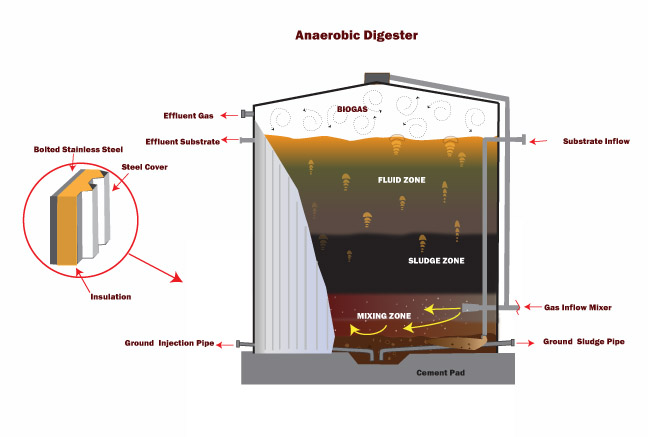Anaerobic digestion is a chemical process in which organic matter is broken down by anaerobic bacteria. This decaying or decomposing process produces a gaseous by-product called biogas, which consists of methane, carbon dioxide and hydrogen sulfide. Sources for anaerobic digestion include municipal wastewater, livestock waste, poultry waste, and food waste. These systems are designed to produce a biogas called methane.
Methane and anaerobic bacteria
Methane is a colorless and odorless gas and is a major component of natural gas. When burned it yields about 1,000 Btu of heat energy per cubic foot. Natural gas is a fossil fuel that was formed millions of years ago from the layers of decomposing plant and animal mater. It is found deep in underground rock formations of coal. Petroleum is another resource and fossil fuel found close to natural gas.
Methane is produced by the same types of anaerobic bacteria that produce natural gas. Some of the oldest forms of life on earth are anaerobic bacteria. They developed gradually prior to the photosynthesis of plants which produced oxygen in the Earth’s atmosphere. Anaerobic bacteria decompose or “digest” organic material and do not have oxygen which produces a biogas as a waste product.
Anaerobic decomposition occurs naturally in bogs, swamps, marshes and other such wetlands that produce peat compost and moss. The processes can be managed in an engineered bolted stainless steel bolted digester tank which provides an environment for natural occurring bacteria to grow, multiply and convert manure to a biogas and low odor liquid waste.
The primary benefits of anaerobic digestion for are
- Less odor
- Energy produced from biogas offsets the cost of investment.
- Reduction of flies and rodents
- Emissions of methane are reduced
- Less dangerous than manure pits
American Structures, Inc. manufactures various types of digesters to fit the customers needs.
Sources:
www.cals.uidaho.edu/edcomm/pdf/CIS/CIS1215.pdf
www.britannica.com/science/anaerobic-digestion
www.daviddarling.info/encyclopedia/A/AE_anaerobic_digestion.html

